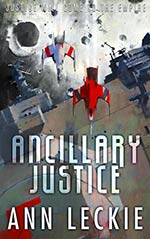
![]() Tar Daddoo
Tar Daddoo
2/16/2015
![]()
What is the Science Fiction Premise?
In Ancillary Justice we encounter a galactic empire that has lasted for many thousands of years. A critical component of the empire's ability to expand is large space-faring battleships that have their own Artificial Intelligence and human-like Ancillary units that share their consciousness. These Ancillary units allow the ship to engage with people at a more human level whether for the purpose of conquest, "nation-building", or picking up the dishes.
Although the book is full of many Science Fiction ideas including galactic empire, faster-than-light travel, cryogenic freezing, cellular regeneration, and artificial intelligence, these are neither explained nor discussed deeply. The key idea -- the Science Fiction Premise -- is the concept of an Ancillary.
Is the science of the premise explored?
Somehow Ancillaries are created from living humans. Following conquest, many of the people are stored for eventual transformation into an Ancillary when the need arises. For all practical purposes, their life ends once they are converted. At that point the ship assumes control of their body and thoughts. They become one with the ship and its other Ancillaries.
The book does not fully explain how the ship can take over a human consciousness. It requires implants of some sort. The focus is not on how Ancillaries are made, but on what they do after they are made.
Is the impact of the premise on an individual explored?
The novel is told in first person from an Ancillary's perspective. In the early part of the book there are three threads woven among one another. Two are flashbacks that fill in history and help portray the nature of an Ancillary's life. The third relates to the Ancillary's current quest.
One interesting and sometimes confusing aspect of the story-telling is the ambiguity about the Ancillary's identity. Is it the ship? Is it an individual? Is it the collection of Ancillaries that operate as a unit? The answer appears to be "yes" and the action can move rather fluidly and without warning among these perspectives.
Is the impact of the premise on society explored?
Ancillaries have played a key role in the expansion of the empire. There are discussions of that role, its morality, and its effectiveness. These are a bit of a sideline, however. The real question is about what this Ancillary plans to do about the current situation in society.
How well written is the story?
Except for the sometimes confusing movements among the Ancillaries many perspectives, the book is easy to read or follow. I mention the perspective shifts more as a warning than as a complaint. While they made the story more puzzle-like, they were absolutely essential to conveying the Ancillary's view of the world.
Can I recommend the book?
I really liked Ancillary Justice. It is lighter on Science than I usually enjoy, but it's a well-told, fun, mystery and adventure. The intellectual challenge lies less in the Science than in appreciating a very different view of the world and one's purpose in it. I look forward to Ancillary Sword, the next book in the series.